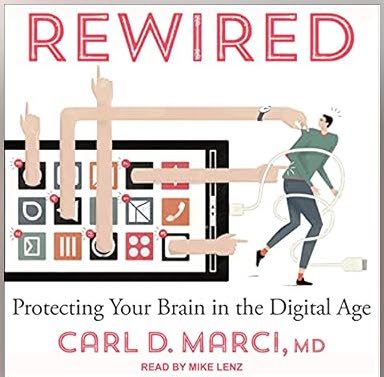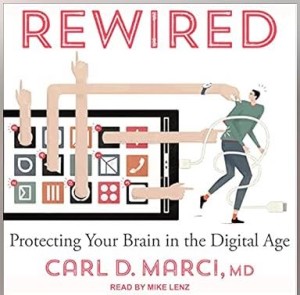

Marci delves deep into the concept of neuroplasticity—the brain’s incredible ability to reorganize itself based on our experiences, thoughts, and behaviors. This adaptability can lead to both positive and negative changes in our neural pathways. While technology has the potential to contribute to distraction and emotional distress, Marci believes it also offers opportunities for proactive brain reshaping. By engaging actively in our brain’s development, we can influence its structure and function to support personal growth and well-being. But we need to take control rather than allow the digital landscape to determine our path.
The book is divided into three main parts. Part 1, “Wired: Connected Brains,” explores how the evolution of media and advertising has prepared the ground for the smartphone era. It highlights the prefrontal cortex’s crucial role in managing our interactions and behaviors. Part 2, “Rewired: Assaulted Brains,” addresses the negative impacts of smartphone use, such as diminished attention spans, increased multitasking, and the risk of developing unhealthy habits and addictions. Marci emphasizes the importance of understanding these effects at various life stages. Finally, Part 3, “Beyond Wired: Better Brains,” offers practical strategies for mitigating the negative impacts of digital technology. Marci provides actionable recommendations for enhancing brain health through digital literacy and mindful tech use, advocating for a balanced approach that maximizes technology’s benefits while minimizing its potential harms.
Rewired covers a wide range of relatable topics, from porn addiction and FOMO to the influence of advertising on obesity and self-image. It tackles how passive technology use affects cognition, attention, and mental health, supported by well-researched studies that separate fact from fiction. Marci’s focus is not just on the negative aspects but also on the brain’s remarkable power to rewire itself. By harnessing the powers of neuroplasticity and cognitive control, we can mitigate the downsides and amplify the benefits of our digital environment.
Marci outlines key principles affecting neuroplasticity, such as how mindfulness, self-reflection, and healthy habits positively impact brain function. For instance, mindfulness and meditation can increase gray matter density in areas associated with memory, learning, and emotional regulation. Positive habits like regular exercise and a nutritious diet also support brain health, improve cognitive function, and reduce inflammation linked to mood disorders.
The book also explores experience-dependent plasticity, which is the idea that our brains change in response to specific activities. Learning new skills—like playing an instrument or acquiring a new language—creates and strengthens neural pathways. Marci provides compelling examples of how people with learning disabilities or cognitive challenges can improve their cognitive functions through targeted exercises and therapies.
Moreover, Rewired addresses the role of emotions in neuroplasticity. Positive emotions such as joy and gratitude can enhance brain health, while negative emotions like stress and anxiety can impede it. By fostering a positive emotional state through practices like mindfulness and meditation, we can promote beneficial brain rewiring and improve our overall well-being.
Marci also highlights the importance of social connections in supporting neuroplasticity. Positive relationships and meaningful social interactions are vital for brain development and adaptability. Strong social bonds not only contribute to emotional resilience but also enhance the brain’s ability to adapt and grow.
Overall, Rewired is both a critical examination of our digital habits and a practical guide to achieving a balanced life. Dr. Marci provides valuable strategies for managing technology use and restoring genuine connections. While acknowledging the significant changes brought about by smartphones and media consumption, he shows that with conscious effort and healthy practices, we have the power to shape our brain’s future. The book offers a hopeful perspective on navigating the digital age, providing actionable advice to help us thrive in both our virtual and real-world interactions.





